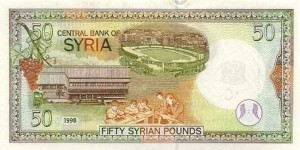 Since the latest nosedive in the Syrian currency, Damascus shopkeeper Aboud Katebee can no longer put price stickers on the imported chocolate bars he sells in the middle class Jaramana neighborhood.
Since the latest nosedive in the Syrian currency, Damascus shopkeeper Aboud Katebee can no longer put price stickers on the imported chocolate bars he sells in the middle class Jaramana neighborhood.
“Every time the dollar rises, I change the pricing of my goods,” said the middle aged merchant, who says he stocks a range of imported and locally produced goods from powdered milk to detergents and vegetable oil.
Talk of Western and Arab military support for rebels trying to topple President Bashar al-Assad has led to panic buying of the U.S. currency by jittery Syrians, pushing the Syrian pound below 200 to the dollar this week, a fall of 20 percent in four days.
Bankers and businessmen contacted by Reuters by telephone say the pound’s weakness could presage a freefall if the central bank runs out of dollars to defend it after two years of civil war that has cost more than 90,000 lives and caused tens of billions of dollars of losses.
Those fears mean the dollar has become central to daily transactions across all walks of life in Syria – in marked contrast to pre-war days when only the wealthy few had dollar-denominated assets.
“Dollar transactions used to be restricted to large traders who would sell with dollars to the wholesaler, but now even the small retailer who sells in Syrian pounds bases his business deals on the daily price movements of the dollar,” said Yousef Safouri, a garment wholesaler in Aleppo.
From fresh produce vendors to manufacturers, from importers to lawyers and taxi drivers, the crisis has brought the dollar into much wider circulation as people try to protect themselves against currency depreciation and inflation.
Officially inflation stands at 50 percent, but economists warn that Syria could be heading for hyperinflation after cumulative falls in the currency of 75 percent since the start of the crisis in March 2011 when one dollar was worth 47 pounds.
European Union sanctions on Syria’s oil exports and a collapse in tourist revenues cut off two main sources of foreign revenue early in the crisis, and since then the unrelenting violence has brought most trade and manufacturing to a halt.
“People are saying to protect our savings we go for dollars because it preserves my wealth,” said a Damascus based banker who added that this meant even greater downward pressure on the pound, whose purchasing power has worsened the plight of ordinary Syrians struggling with everyday life.
PRICES SURGE
A Facebook page used by Syrian activists said that the price of bulgur wheat rose to 85 pounds from 65 pounds in one morning, while rice jumped to 145 pounds from 125 and flour rose to 97 pounds from 85.
“We are living day by day. My salary does not do anything,” said Abdullah Awadat, a state employee in Deraa municipality, whose 15,000 pound salary now barely covers his food purchases for the first two weeks of the month.
Traders said several shopping outlets in the northern city of Aleppo and in the capital Damascus saw higher than usual sales, as shoppers hoarded some products, fearing the impact of the soaring dollar on the price of goods in the days ahead.
“I went to shop this morning and bought with the few pounds I have some detergents and imported canned foods, which I know I will wake up tomorrow and find has gone up in price at least 30 percent,” said Umm Ibrahim, a housewife in the Muhajireen district of Damascus.
For many industrialists and businessmen the fluctuations in the pound have made it difficult to plan ahead.
“The wild fluctuations of the pound are wreaking havoc on our ability to plan production costs,” said Essam Zamrick, deputy head of the Damascus chamber of industry, who owns a food additives factory.
But the plunge is not bad news for everyone, with the state incurring lower costs on a hefty salaries bill for more than 1.8 million state employees from foreign reserves while black market profiteers hoarding subsidized goods are now thriving.
“It’s cheaper for the state to pay its salaries at a higher dollar rate. Today the government’s monthly salaries expenditure is a quarter of what it was prior to the crisis if you are talking in U.S. dollar terms,” said one banker.
The central bank’s inaction had left the exchange market in chaos with multiple prices offered by dealers, traders say.
“Every dealer gives a price – between 180 and 220 in the last few days,” one Damascus banker said. “But I wouldn’t quote a price because there are no quantities (of dollars) to back it up.”
In Yousef al-Azmeh square, a pedestrian thoroughfare thronged with money changers, a wait-and-see mood prevails with the market awaiting a corrective move by the central bank, a currency trader told Reuters by telephone.
“No one is giving prices, People are waiting and not much selling is taking place. Everyone is waiting to see what will happen,” said Anas Salamah.
“We can only see double digit and three digit jumps from now. The more the dollar goes up and up and isn’t corrected, the more people will jump on the bandwagon,” he added, predicting that only a surprise breakthrough in the Syrian crisis could reverse the pound’s falls.
Reuters
Photo: Prior to March 15, 2011 this banknote was worth about a Dollar , now it is worth less than a quarter of a US Dollar.

Leave a Reply
You must be logged in to post a comment.